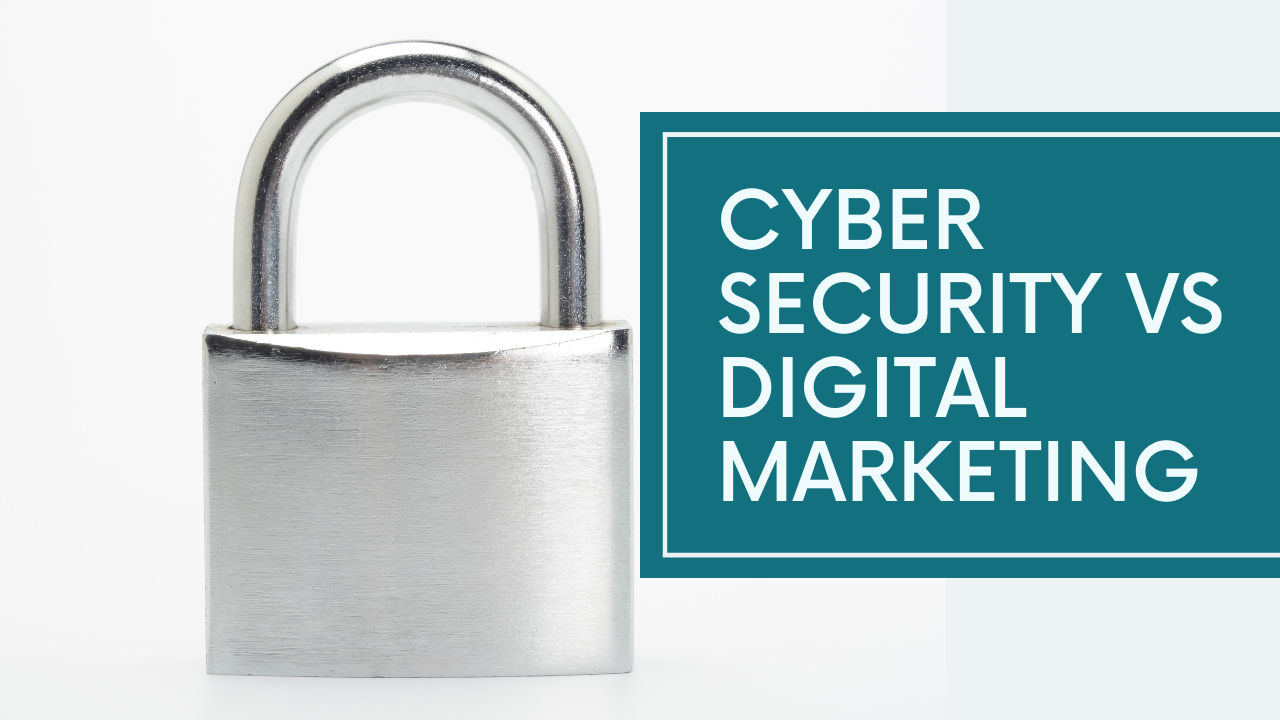Cyber Security Vs Digital Marketing, Cybersecurity protects digital assets from cyber threats, while digital marketing promotes products or services online. Both fields serve different purposes and are equally important in the digital age.
In today’s highly interconnected and technology-driven world, cyber threats are a constant concern for businesses and individuals. Cybersecurity professionals play a crucial role in safeguarding sensitive data and systems from unauthorized access, hacking, and other malicious activities. Their focus is on preventing and mitigating cyber risks to ensure the smooth and secure operation of digital platforms.
On the other hand, digital marketing aims to optimize online presence and engage target audiences. It involves using various digital channels, such as social media, search engines, and email marketing, to promote products or services, build brand awareness, and drive sales.
Digital marketers leverage data and analytics to create effective marketing strategies and campaigns, reaching a wider audience and achieving business goals. While the two fields may seem unrelated, they are intertwined in today’s digital landscape. Cybersecurity is crucial for maintaining the trust and reputation of a brand, while digital marketing relies on secure platforms and data to effectively engage and convert customers.
Both fields offer promising career opportunities and require specialized skills and knowledge. Cyber security and digital marketing are distinct yet interconnected disciplines that play essential roles in the modern digital world. Businesses and individuals must prioritize cyber security to protect their digital assets, while digital marketing empowers brands to succeed in the online marketplace.
Interaction Between Cyber Security And Marketing
The interaction between cyber security and marketing is crucial in today’s digital landscape. Cyber security ensures the protection of brand reputation and customer trust, acting as a barrier against potential threats. This allows digital marketing to thrive in a safe and secure environment.
Importance Of Cybersecurity In Safeguarding Marketing Assets
In today’s digital age, cybersecurity is of utmost importance for safeguarding marketing assets. A single cyber threat can wreak havoc on a company’s reputation, compromise customer data, and disrupt marketing efforts. By implementing robust cybersecurity measures, companies can ensure the safety and integrity of their marketing assets.
These assets include websites, social media profiles, email databases, customer information, and digital advertising campaigns. With strong cybersecurity in place, businesses can protect their brand image, maintain customer trust, and avoid potential legal and financial implications.
How Cyber Threats Can Undermine Digital Marketing Efforts
Cyber threats pose a significant risk to digital marketing efforts. Malicious actors can launch various cyberattacks, such as data breaches, phishing scams, or website defacement, which can directly impact a company’s marketing campaigns. For example, if customer data gets compromised, it can lead to a loss of trust and credibility, resulting in a decline in customer engagement and conversions.
In addition, a hacked website or social media account can damage a brand’s reputation and lead to negative publicity. Cyber threats can disrupt marketing activities, as businesses may need to divert resources toward resolving security breaches instead of focusing on their marketing objectives.
Strategies To Align Cybersecurity With Marketing Objectives
To ensure a harmonious interaction between cybersecurity and marketing, businesses need to align their cybersecurity strategies with their marketing objectives. Here are some strategies to consider:
- Educate employees: Provide comprehensive cybersecurity training and awareness programs to all employees involved in marketing activities. This will help them recognize and respond to potential cyber threats effectively.
- Implement strong access controls: Maintain strict access controls for marketing assets, such as social media accounts and advertising platforms. This includes using unique and complex passwords, enabling two-factor authentication, and regularly reviewing and revoking access permissions.
- Regularly update and patch systems: Keep all marketing-related software, plugins, and platforms up-to-date with the latest security patches. This helps protect against known vulnerabilities that cybercriminals may exploit.
- Backup important data: Regularly back up marketing assets and customer data to ensure that they can be easily restored in case of a cyber-attack or system failure. Backup data should be stored securely and separate from the primary system.
- Monitor and detect threats: Implement robust monitoring systems and security tools to detect and respond to potential cyber threats in real time. This includes setting up system alerts, conducting regular vulnerability scans, and monitoring network traffic for suspicious activities.
- Create incident response plans: Develop a detailed incident response plan that outlines the steps to be taken in case of a cyber attack. This plan should include procedures for containing the threat, mitigating the impact, notifying relevant stakeholders, and recovering the affected marketing assets.
- Stay updated on the latest threats: Stay informed about the latest cyber threats and trends in the digital marketing industry. This includes regularly monitoring industry news, participating in cybersecurity forums, and engaging with cybersecurity experts to ensure proactive protection.
Cyber Security In The Marketing Spotlight
Cybersecurity is an integral part of digital marketing, protecting brand reputation and customer trust. It acts as a barrier against potential threats in the technology-driven digital marketing landscape.
The Increasing Role Of Cybersecurity In Digital Marketing Campaigns
In today’s digital landscape, cybersecurity has taken center stage in digital marketing campaigns. Companies are realizing the importance of safeguarding their online assets and protecting customer data from cyber threats. Cybersecurity measures are being integrated into every aspect of digital marketing, ensuring a secure and trustworthy environment for both businesses and consumers.
As cyber-attacks become more sophisticated and pervasive, marketers are recognizing the need to prioritize cybersecurity in their strategies. They are investing in robust security measures to mitigate risks and build trust with their target audiences. By incorporating cybersecurity into their digital marketing campaigns, companies can demonstrate their commitment to protecting customer data and sensitive information.
Cybersecurity As A Unique Selling Point In Marketing Strategies
In the highly competitive digital landscape, businesses are constantly searching for unique selling points to stand out from their competitors. Cybersecurity can serve as a powerful differentiator in marketing strategies. By highlighting their strong cybersecurity measures, companies can reassure customers about the safety of their personal information and transactions.
When customers are confident in a company’s cybersecurity practices, they are more likely to engage with its digital marketing efforts. They feel safe providing their data and are more willing to make purchases online. Cybersecurity becomes a value proposition that sets a company apart from others and gives customers peace of mind.
Case Studies: Companies Leveraging Cybersecurity In Marketing
Several companies have successfully leveraged cybersecurity in their marketing strategies, demonstrating its effectiveness as a selling point. These case studies serve as inspiration for other businesses looking to enhance their marketing efforts with cybersecurity.
1. Company XYZ: XYZ is an e-commerce platform that specializes in selling electronics. They prominently display their cybersecurity certifications and partnerships on their website, assuring customers that their data is protected. This transparent approach has boosted customer trust, resulting in increased sales and customer loyalty.
2. Company ABC: ABC is a software company that develops mobile applications. They recently launched a marketing campaign centered around the security features of their app. By highlighting their encryption methods and regular security audits, they gained a significant edge over their competitors. The campaign not only attracted new customers but also established ABC as a trusted name in the industry.
3. Company DEF: DEF is a financial institution that offers online banking services. They heavily emphasize their cybersecurity measures in their marketing materials and social media posts. This approach has helped them build a strong reputation for protecting customer data, leading to a steady growth in their customer base.
By implementing cybersecurity in their digital marketing strategies, these companies have not only bolstered their security measures but also gained a competitive advantage. They have effectively showcased their commitment to protecting customer data and have attracted a loyal customer base as a result.
In conclusion, cybersecurity has become increasingly important in digital marketing campaigns. It not only safeguards a company’s digital assets but also serves as a unique selling point to differentiate from competitors. By leveraging cybersecurity in their marketing strategies, companies can build trust, attract customers, and establish themselves as leaders in the industry.
Building Trust With Cyber Security Measures
Building trust with cyber security measures is crucial in the world of digital marketing. By implementing strong security protocols, brands can protect their data and ensure the safety of their customers, ultimately fostering trust and confidence in their online presence.
Digital marketing involves promoting products or services online.
In the ever-evolving digital landscape, building trust with consumers is crucial for the success of any brand. Implementing cyber secure practices is an essential step in enhancing brand perception, ensuring that customers feel safe and trust the company they are engaging with.
Implementing cyber secure practices to enhance brand perception
In today’s digital age, data breaches and cyber attacks have become increasingly common. Consumers are more aware of the risks involved in sharing personal information online, and they expect businesses to protect their data. By implementing robust cyber secure practices, brands can show their commitment to safeguarding customer information. These practices include:
1. Two-factor authentication: Adding an extra layer of security by requiring users to verify their identity through a second method, such as a text message or email code.
2. Regular security updates and patches: Keeping software and systems up to date to address any vulnerabilities and protect against potential threats.
3. Encryption: Using encryption technology to secure data in transit and at rest, preventing unauthorized access to sensitive information.
4. Employee training and awareness: Educating employees about cyber threats and best practices for data security to minimize the risk of human error.
Educating consumers on the importance of security in marketing
While brands take necessary steps to protect against cyber threats, it is equally important to educate consumers about the importance of security in their marketing efforts. This can be done through various channels, such as:
1. Blog posts and articles: Explaining common cyber threats, providing tips for online safety, and highlighting how the brand ensures customer data protection.
2. Social media campaigns: Sharing informative content about cybersecurity and encouraging followers to take steps to protect their personal information.
3. Email newsletters: Send out newsletters that include security tips and updates on the brand’s security measures to build trust and credibility.
4. Webinars and workshops: Hosting online events to educate customers about the risks they may encounter and how they can protect themselves online.
Examples of security breaches and the impact on brand trust
There have been numerous high-profile security breaches in recent years that have had a significant impact on brand trust. These breaches not only compromised customer data but also damaged the reputation of the affected companies. Some notable examples include:
1. Equifax data breach: In 2017, Equifax, one of the largest credit reporting agencies, experienced a cyber attack that exposed the personal information of approximately 147 million individuals. The breach led to a loss of trust in Equifax’s ability to protect customer data.
2. Yahoo data breaches: Between 2013 and 2016, Yahoo experienced two major data breaches that affected over 3 billion user accounts. These breaches not only resulted in stolen user data but also led to a decline in Yahoo’s brand reputation and the value of the company, ultimately impacting its acquisition by Verizon.
3. Facebook-Cambridge Analytica scandal: In 2018, it was revealed that Cambridge Analytica, a political consulting firm, gained unauthorized access to the personal data of millions of Facebook users. This breach raised concerns about Facebook’s handling of user data and eroded trust in the platform’s privacy practices.
These examples highlight the importance of implementing robust cybersecure practices to protect customer data and maintain brand trust. By prioritizing cybersecurity and educating consumers on the importance of security measures, brands can establish themselves as trustworthy entities in the digital realm.

Credit: www.pcmag.com
Digital Marketing Adaptations For Security
With the increasing dependence on technology and the internet for digital marketing, cybersecurity becomes crucial in protecting brand reputation and ensuring customer trust. Cybersecurity acts as a barrier against potential threats, safeguarding the digital marketing environment and allowing businesses to optimize their online presence.
Adapting Digital Marketing Strategies To Address Cybersecurity Concerns
In today’s digital landscape, cybersecurity is a top priority for businesses engaging in digital marketing. It is crucial to adapt digital marketing strategies to address cybersecurity concerns and protect both consumer data and brand reputation. By implementing proactive measures, businesses can ensure a safe and secure online environment for their customers.
Secure Content Distribution Channels To Protect Consumer Data
To safeguard consumer data, businesses need to secure their content distribution channels. This involves implementing robust encryption methods, firewalls, and secure authentication protocols. By doing so, businesses can ensure that sensitive information is transmitted securely, reducing the risk of data breaches and unauthorized access.
One effective strategy is to establish secure channels for content distribution. This can be achieved by using reliable Content Delivery Networks (CDNs) that offer enhanced security features. CDNs help protect against distributed denial-of-service (DDoS) attacks and provide secure transmission of data to users. By partnering with reputable CDNs, businesses can mitigate security risks and maintain the integrity of their content distribution channels, ensuring customer data remains protected.
Marketing The Value Of Data Security In An Online World
In an online world where data breaches are becoming more common, businesses must prioritize data security and communicate its value to their customers. By marketing the steps they take to protect consumer data, businesses build trust and reassure customers that their information is safe.
One strategy is to highlight the use of robust security measures throughout the customer journey. This can be done by prominently displaying trust seals, SSL certificates, or security badges on websites and marketing materials. Such visual cues convey the message that the business takes data security seriously and instills confidence in users.
Additionally, businesses can educate their customers about the importance of data security and the steps they should take to protect themselves online. This can be achieved through informative blog posts, social media campaigns, or email marketing. By empowering customers with knowledge about data security best practices, businesses not only protect their customers but also position themselves as trustworthy and reliable in the digital landscape.
In conclusion, adapting digital marketing strategies to address cybersecurity concerns is vital for the success and security of businesses in the online world. By securing content distribution channels, marketing the value of data security, and implementing robust security measures, businesses can build trust, protect consumer data, and enhance their online presence.
Cyber Security’s Influence On Market Success
Cybersecurity plays a vital role in digital marketing by safeguarding brand reputation and customer trust. It acts as a barrier against potential threats, protecting the digital marketing landscape driven by technology and the internet.
Analyzing The Roi Of Cybersecurity Investments In Marketing
Cybersecurity investments play a significant role in ensuring the success of digital marketing strategies. By analyzing the return on investment (ROI) of cybersecurity investments, businesses can understand the value it brings to their marketing efforts. Implementing robust cybersecurity measures protects sensitive customer information, builds trust, and safeguards brand reputation. When customers feel secure interacting with a brand online, they are more likely to convert and become loyal advocates.
The Role Of Security In Customer Retention And Acquisition
Customer retention and acquisition are vital for the growth of any business. A robust cybersecurity system plays a crucial role in acquiring new customers and retaining existing ones. By prioritizing security, businesses can demonstrate their commitment to protecting customer data and privacy.
This builds trust and confidence, ultimately leading to increased customer loyalty. In contrast, a security breach can have devastating consequences, resulting in the loss of customers and damaging the brand’s reputation. Therefore, integrating cybersecurity into marketing strategies is essential for both customer retention and acquisition.
Factoring Security Into Marketing Budget Allocation And Forecasting
When creating a marketing budget, it is crucial to allocate funds for cybersecurity measures. Including security as a line item ensures that it receives the necessary attention and resources. By factoring security into the marketing budget allocation and forecasting, businesses can proactively address potential threats and vulnerabilities.
This not only safeguards the marketing efforts but also protects the overall success of the business. It is important to understand that cybersecurity is not a one-time investment but an ongoing process that requires continuous monitoring and adaptation.
Frequently Asked Questions Of Cyber Security Vs Digital Marketing
Is Digital Marketing Better Or Cyber Security?
In the comparison between digital marketing and cyber security, both are crucial in their own ways. Cyber security protects digital assets from threats, while digital marketing focuses on promoting products and services online. Both careers are important, but if you prefer a skill-based field, choose digital marketing.
Is A Career In Cyber Security Good Or Bad?
A career in cyber security is good. It has many advantages and offers personal and professional growth. The field is still growing, with plenty of opportunities to explore and learn vital skills through IT Security training courses.
Is Cyber Security Worth Getting Into?
Yes, cyber security is worth getting into. It offers well-paid information security jobs and provides protection against potential threats in the digital marketing environment. A degree in cybersecurity can lead to various career opportunities in the field.
Is It Better To Study Cyber Security Or It?
Choosing between studying cyber security and IT depends on your career goals. If you want specialized roles, study cyber security. If you prefer a wider field, choose IT. Both fields are interconnected and have their own importance.
Is Cyber Security Necessary For Digital Marketing?
Yes, Cyber Security is essential for Digital Marketing as it protects brand reputation and customer trust by acting as a barrier against potential threats.
What Are The Advantages Of A Career In Cyber Security?
A career in cybersecurity offers personal and professional growth opportunities, with a lot to explore in the field. IT Security training courses can help you acquire vital skills.
Is It Worth Getting A Degree In Cyber Security?
Yes, a degree in Cyber Security is worth it for individuals looking to pursue a career in the field. It can lead to well-paid information security jobs, with most positions requiring at least a bachelor’s degree.
Should I Study Cyber Security Or It?
If you want to specialize in a focused skill set, consider Cyber Security. If you prefer broader knowledge in a wider field, choose IT. Both fields overlap and are dependent on each other in many ways.
What Is The Difference Between Cyber Security And Digital Marketing?
Cyber Security focuses on protecting digital assets from cyber threats, while Digital Marketing involves promoting products or services online. Cyber Security safeguards data and systems, while Digital Marketing aims to optimize online presence and engage audiences.
Which Career Path Is Better, Cyber Security Or Digital Marketing?
Both career paths hold equal importance, but it is suggested to go for Digital Marketing due to its growth potential at the present time.
Conclusion
In today’s digital landscape, the importance of cybersecurity in digital marketing cannot be overstated. As technology continues to advance, businesses heavily rely on digital platforms to promote their products and services. Cybersecurity acts as a crucial barrier against potential threats, protecting brand reputation and customer trust.
By prioritizing cybersecurity, businesses can create a secure online environment that is essential for the success of their digital marketing efforts. So, whether you choose a career in cybersecurity or digital marketing, it is crucial to understand the symbiotic relationship between the two fields.
Find the right balance to ensure the safety and effectiveness of your digital marketing strategies.






